翻译复习
- 格式:doc
- 大小:42.00 KB
- 文档页数:5
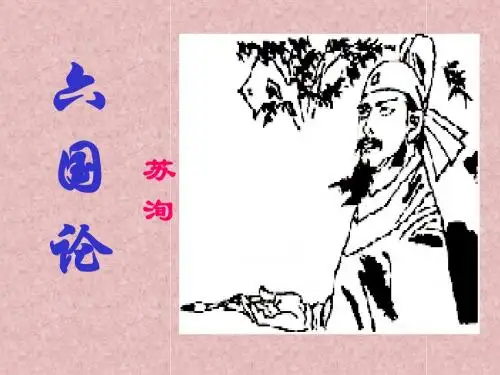
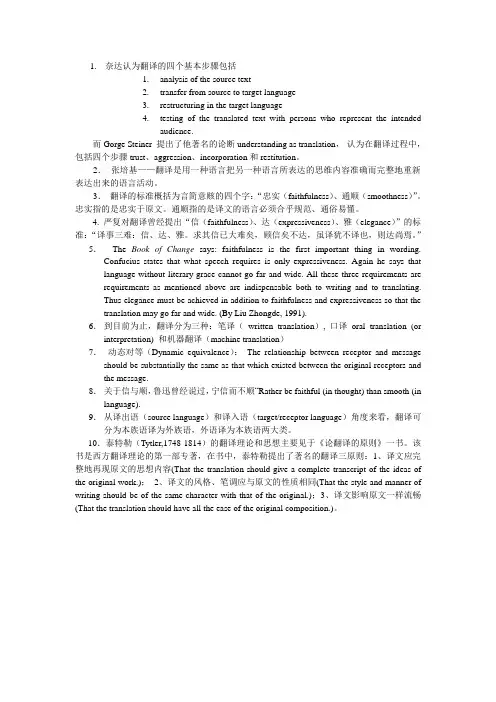
1.奈达认为翻译的四个基本步骤包括1.analysis of the source text2.transfer from source to target language3.restructuring in the target language4.testing of the translated text with persons who represent the intendedaudience.而Gorge Steiner 提出了他著名的论断understanding as translation,认为在翻译过程中,包括四个步骤trust、aggression、incorporation和restitution。
2.张培基——翻译是用一种语言把另一种语言所表达的思维内容准确而完整地重新表达出来的语言活动。
3.翻译的标准概括为言简意赅的四个字:“忠实(faithfulness)、通顺(smoothness)”。
忠实指的是忠实于原文。
通顺指的是译文的语言必须合乎规范、通俗易懂。
4. 严复对翻译曾经提出“信(faithfulness)、达(expressiveness)、雅(elegance)”的标准:“译事三难:信、达、雅。
求其信已大难矣,顾信矣不达,虽译犹不译也,则达尚焉。
”5.The Book of Change says: faithfulness is the first important thing in wording.Confucius states that what speech requires is only expressiveness. Again he says that language without literary grace cannot go far and wide. All these three requirements are requirements as mentioned above are indispensable both to writing and to translating.Thus elegance must be achieved in addition to faithfulness and expressiveness so that the translation may go far and wide. (By Liu Zhongde, 1991).6.到目前为止,翻译分为三种:笔译(written translation), 口译oral translation (or interpretation) 和机器翻译(machine translation)7.动态对等(Dynamic equivalence):The relationship between receptor and message should be substantially the same as that which existed between the original receptors and the message.8.关于信与顺,鲁迅曾经说过,宁信而不顺“Rather be faithful (in thought) than smooth (in language).9.从译出语(source language)和译入语(target/receptor language)角度来看,翻译可分为本族语译为外族语,外语译为本族语两大类。
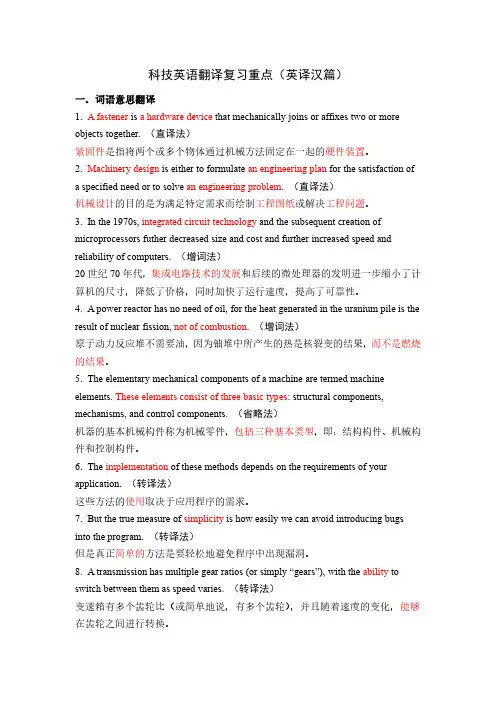
科技英语翻译复习重点(英译汉篇)一、词语意思翻译1.A fastener is a hardware device that mechanically joins or affixes two or more objects together.(直译法)紧固件是指将两个或多个物体通过机械方法固定在一起的硬件装置。
2.Machinery design is either to formulate an engineering plan for the satisfaction ofa specified need or to solve an engineering problem.(直译法)机械设计的目的是为满足特定需求而绘制工程图纸或解决工程问题。
3.In the1970s,integrated circuit technology and the subsequent creation of microprocessors futher decreased size and cost and further increased speed and reliability of computers.(增词法)20世纪70年代,集成电路技术的发展和后续的微处理器的发明进一步缩小了计算机的尺寸,降低了价格,同时加快了运行速度,提高了可靠性。
4.A power reactor has no need of oil,for the heat generated in the uranium pile is the result of nuclear fission,not of combustion.(增词法)原子动力反应堆不需要油,因为铀堆中所产生的热是核裂变的结果,而不是燃烧的结果。
5.The elementary mechanical components of a machine are termed machine elements.These elements consist of three basic types:structural components, mechanisms,and control components.(省略法)机器的基本机械构件称为机械零件,包括三种基本类型,即:结构构件、机械构件和控制构件。
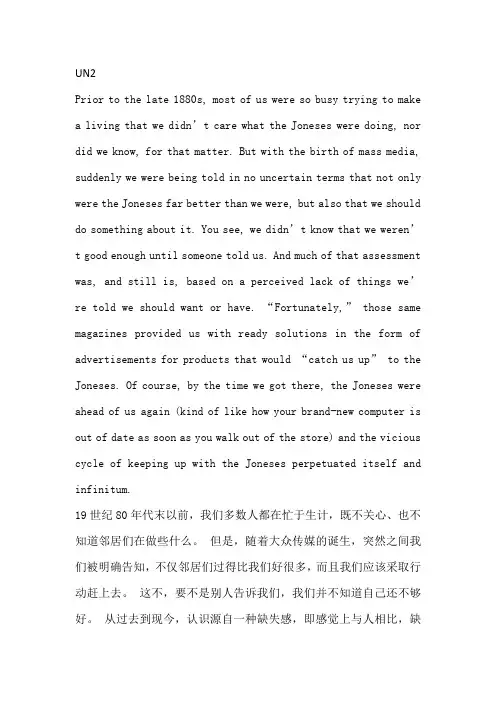
UN2Prior to the late 1880s, most of us were so busy trying to make a living that we didn’t care what the Joneses were doing, nor did we know, for that matter. But with the birth of mass media, suddenly we were being told in no uncertain terms that not only were the Joneses far better than we were, but also that we should do something about it. You see, we didn’t know that we weren’t good enough until someone told us. And much of that assessment was, and still is, based on a perceived lack of things we’re told we should want or have. “Fortunately,” those same magazines provided us with ready solutions in the form of advertisements for products that would “catch us up” to the Joneses. Of course, by the time we got there, the Joneses were ahead of us again (kind of like how your brand-new computer is out of date as soon as you walk out of the store) and the vicious cycle of keeping up with the Joneses perpetuated itself and infinitum.19世纪80年代末以前,我们多数人都在忙于生计,既不关心、也不知道邻居们在做些什么。
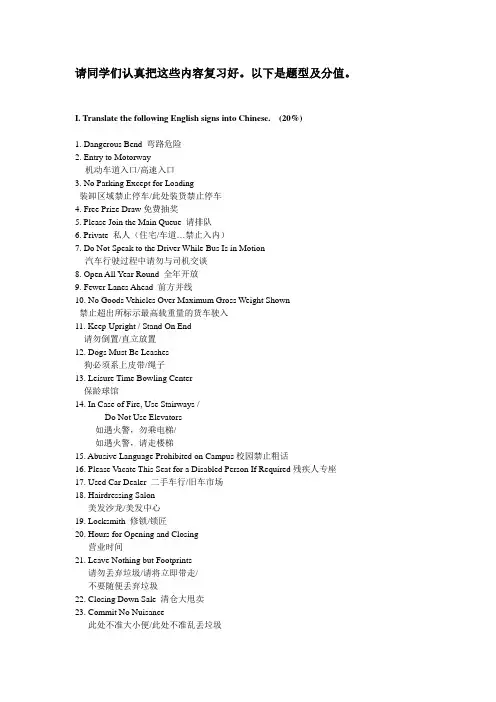
请同学们认真把这些内容复习好。
以下是题型及分值。
I. Translate the following English signs into Chinese. (20%)1. Dangerous Bend 弯路危险2. Entry to Motorway机动车道入口/高速入口3. No Parking Except for Loading装卸区域禁止停车/此处装货禁止停车4. Free Prize Draw免费抽奖5. Please Join the Main Queue 请排队6. Private 私人(住宅/车道…禁止入内)7. Do Not Speak to the Driver While Bus Is in Motion汽车行驶过程中请勿与司机交谈8. Open All Year Round 全年开放9. Fewer Lanes Ahead 前方并线10. No Goods Vehicles Over Maximum Gross Weight Shown禁止超出所标示最高载重量的货车驶入11. Keep Upright / Stand On End请勿倒置/直立放置12. Dogs Must Be Leashes狗必须系上皮带/绳子13. Leisure Time Bowling Center保龄球馆14. In Case of Fire, Use Stairways /Do Not Use Elevators如遇火警,勿乘电梯/如遇火警,请走楼梯15. Abusive Language Prohibited on Campus校园禁止粗话16. Please Vacate This Seat for a Disabled Person If Required残疾人专座17. Used Car Dealer 二手车行/旧车市场18. Hairdressing Salon美发沙龙/美发中心19. Locksmith 修锁/锁匠20. Hours for Opening and Closing营业时间21. Leave Nothing but Footprints请勿丢弃垃圾/请将立即带走/不要随便丢弃垃圾22. Closing Down Sale 清仓大甩卖23. Commit No Nuisance此处不准大小便/此处不准乱丢垃圾24. Repair in Progress 修理中25. Reserved for the Elderly, Infirm, Sick, Disabled, and Pregnant老,弱,病,残,孕专座26. Do Not Touch the Exhibits / Objects请勿触摸展品27. No Admittance 请勿入内28. No Visitors 旅客止步29. Passport Control 入境检验30. This Work will Be Completed by the End of This Year. Thank You for Your Patience During the Inevitable Disruption 此工程将于年底竣工,感谢您施工期间的理解。
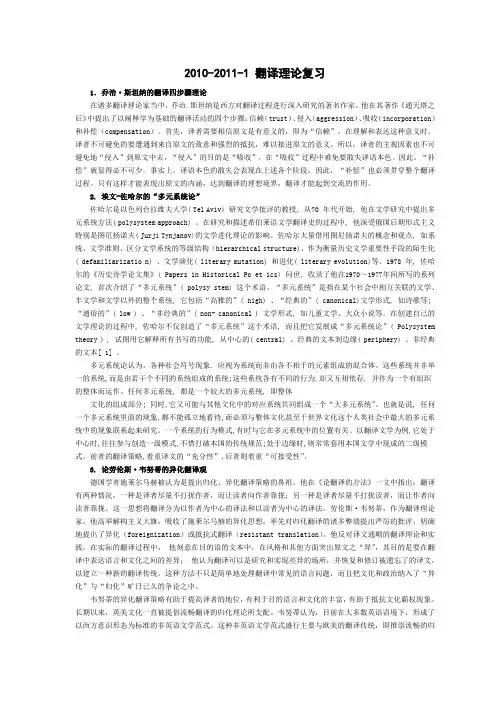
2010-2011-1 翻译理论复习1.乔治·斯坦纳的翻译四步骤理论在诸多翻译理论家当中,乔治.斯坦纳是西方对翻译过程进行深入研究的著名作家。
他在其著作《通天塔之后》中提出了以阐释学为基础的翻译活动的四个步骤:信赖(trust)、侵入(aggression)、吸收(incorporation)和补偿(compensation)。
首先,译者需要相信原文是有意义的,即为“信赖”,在理解和表达这种意义时,译者不可避免的要遭遇到来自原文的敌意和强烈的抵抗,难以接进原文的意义。
所以,译者的主观因素也不可避免地“侵入”到原文中去,“侵入”的目的是“吸收”,在“吸收”过程中难免要散失译语本色。
因此,“补偿”就显得必不可少。
事实上,译语本色的散失会表现在上述各个阶段,因此,“补偿”也必须贯穿整个翻译过程。
只有这样才能表现出原文的内涵,达到翻译的理想境界,翻译才能起到交流的作用。
2. 埃文-佐哈尔的“多元系统论”佐哈尔是以色列台拉维夫大学( Tel Aviv) 研究文学批评的教授, 从70 年代开始, 他在文学研究中提出多元系统方法( polysystem approach) 。
在研究和描述希伯莱语文学翻译史的过程中, 他深受俄国后期形式主义特别是图尼扬诺夫( Jurji Tynjanov)的文学进化理论的影响。
佐哈尔大量借用图尼扬诺夫的概念和观点, 如系统、文学准则、区分文学系统的等级结构(hierarchical structure)、作为衡量历史文学重要性手段的陌生化( defamiliarizatio n) 、文学演化( literary mutation) 和进化( literary evolution)等。
1978 年, 佐哈尔的《历史诗学论文集》( Papers in Historical Po et ics) 问世, 收录了他在1970~1977年间所写的系列论文, 首次介绍了“多元系统”( polysy stem) 这个术语。
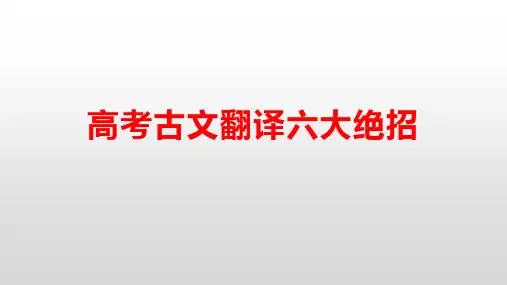
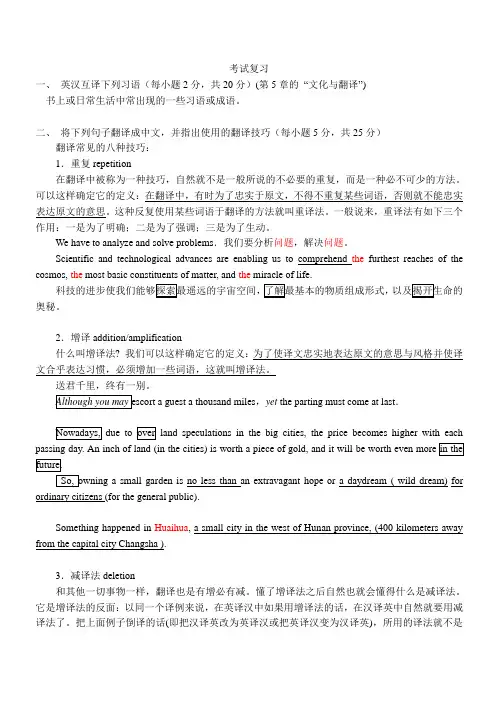
考试复习一、英汉互译下列习语(每小题2分,共20分)(第5章的“文化与翻译”)书上或日常生活中常出现的一些习语或成语。
二、将下列句子翻译成中文,并指出使用的翻译技巧(每小题5分,共25分)翻译常见的八种技巧:1.重复repetition在翻译中被称为一种技巧,自然就不是一般所说的不必要的重复,而是一种必不可少的方法。
可以这样确定它的定义:在翻译中,有时为了忠实于原文,不得不重复某些词语,否则就不能忠实表达原文的意思。
这种反复使用某些词语于翻译的方法就叫重译法。
一般说来,重译法有如下三个作用:一是为了明确;二是为了强调;三是为了生动。
We have to analyze and solve problems.我们要分析问题,解决问题。
Scientific and technological advances are enabling us to comprehend the furthest reaches of the cosmos, the most basic constituents of matter, and the miracle of life.奥秘。
2.增译addition/amplification什么叫增译法? 我们可以这样确定它的定义:为了使译文忠实地表达原文的意思与风格并使译文合乎表达习惯,必须增加一些词语,这就叫增译法。
送君千里,终有一别。
,yet the parting must come at last.due to land speculations in the big cities, the price becomes higher with eacha small garden is no less than an extravagant hope or a daydream ( wild dream) for ordinary citizens (for the general public).Something happened in Huaihua, a small city in the west of Hunan province, (400 kilometers away from the capital city Changsha ).3.减译法deletion和其他一切事物一样,翻译也是有增必有减。
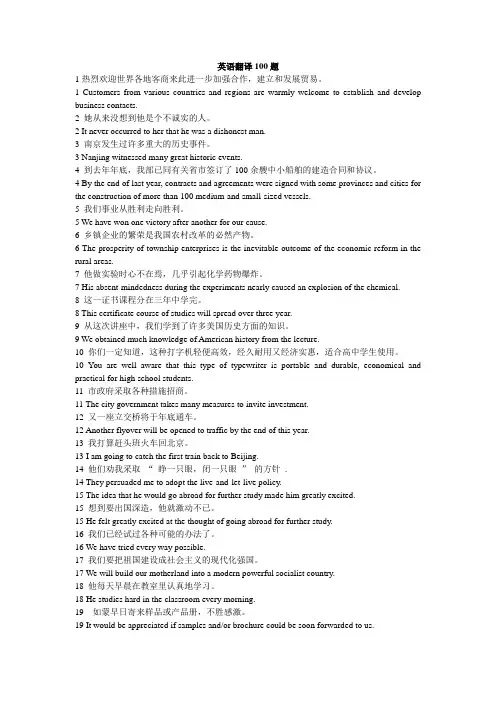
英语翻译100题1热烈欢迎世界各地客商来此进一步加强合作,建立和发展贸易。
1 Customers from various countries and regions are warmly welcome to establish and develop business contacts.2 她从来没想到他是个不诚实的人。
2 It never occurred to her that he was a dishonest man.3 南京发生过许多重大的历史事件。
3 Nanjing witnessed many great historic events.4 到去年年底,我部已同有关省市签订了100余艘中小船舶的建造合同和协议。
4 By the end of last year, contracts and agreements were signed with some provinces and cities for the construction of more than 100 medium-and small-sized vessels.5 我们事业从胜利走向胜利。
5 We have won one victory after another for our cause.6 乡镇企业的繁荣是我国农村改革的必然产物。
6 The prosperity of township enterprises is the inevitable outcome of the economic reform in the rural areas.7 他做实验时心不在焉,几乎引起化学药物爆炸。
7 His absent-mindedness during the experiments nearly caused an explosion of the chemical.8 这一证书课程分在三年中学完。
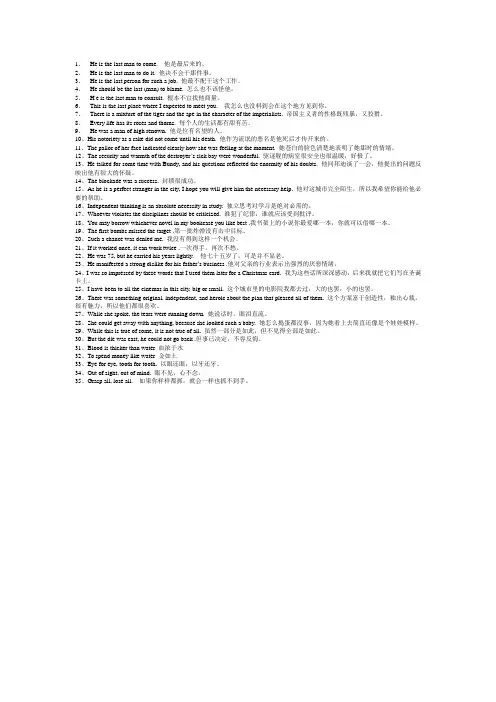
1、He is the last man to come. 他是最后来的。
2、He is the last man to do it. 他决不会干那件事。
3、He is the last person for such a job. 他最不配干这个工作。
4、He should be the last (man) to blame. 怎么也不该怪他。
5、H e is the last man to consult. 根本不宜找他商量。
6、This is the last place where I expected to meet you. 我怎么也没料到会在这个地方见到你。
7、There is a mixture of the tiger and the ape in the character of the imperialists. 帝国主义者的性格既残暴,又狡猾。
8、Every life has its roses and thorns. 每个人的生活都有甜有苦。
9、He was a man of high renown. 他是位有名望的人。
10、His notoriety as a rake did not come until his death. 他作为流氓的恶名是他死后才传开来的。
11、The pallor of her face indicated clearly how she was feeling at the moment. 她苍白的脸色清楚地表明了她那时的情绪。
12、The security and warmth of the destroyer’s sick bay were wonderful. 驱逐舰的病室很安全也很温暖,好极了。
13、He talked for some time with Bundy, and his questions reflected the enormity of his doubts. 他同邦迪谈了一会,他提出的问题反映出他有很大的怀疑。
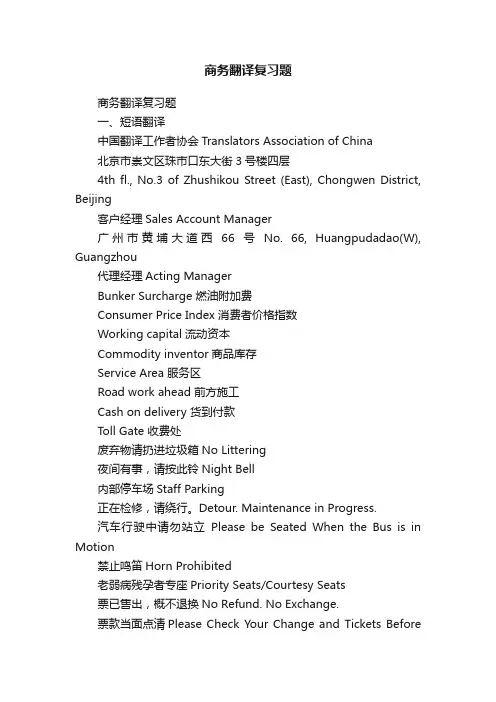
商务翻译复习题商务翻译复习题一、短语翻译中国翻译工作者协会Translators Association of China北京市崇文区珠市口东大街3号楼四层4th fl., No.3 of Zhushikou Street (East), Chongwen District, Beijing客户经理Sales Account Manager广州市黄埔大道西66号No. 66, Huangpudadao(W), Guangzhou代理经理Acting ManagerBunker Surcharge 燃油附加费Consumer Price Index 消费者价格指数Working capital流动资本Commodity inventor商品库存Service Area 服务区Road work ahead 前方施工Cash on delivery 货到付款Toll Gate 收费处废弃物请扔进垃圾箱No Littering夜间有事,请按此铃Night Bell内部停车场Staff Parking正在检修,请绕行。
Detour. Maintenance in Progress.汽车行驶中请勿站立Please be Seated When the Bus is in Motion禁止鸣笛Horn Prohibited老弱病残孕者专座Priority Seats/Courtesy Seats票已售出,概不退换No Refund. No Exchange.票款当面点清Please Check Your Change and Tickets BeforeLeaving禁止未成年人进入Adults Only注意安全,请勿靠近Keep Away for Safety请勿携带外食进入(麦当劳餐厅)Consumption of MacDonald Foods Only 请您带好随身物品Do Not Leave Your Belongings Behind伸手出水Automatic Tap避光保存Keep in Dark Place工会Labor Union联合国粮食与农业组织(粮农组织)Food and Agriculture Organization 海关总署General Administration of Customs 非洲发展基金African Development FundHSBC Holdings 汇丰控股中国石化SinopecJoint venture 合资企业Normal skin中性皮肤Description性状Indications 适应症Dosage and administration用法与用量Down wear羽绒服装Lower fuel consumption and emission 低油耗,低排放行李存放处Luggage Depository租车服务car rental前台front desk节约能源Save Energy此路封闭Road closed休闲服casual wear礼服formal wear针织服knitted garments免费西式自助早餐Complimentary western buffet breakfaststanding orders 长期订单deal on credit 信用交易/赊账买卖sole agency独家代理freight forwarder货运代理commercial invoice商业发票payment in advance预付货款D/P付款交单(document against paymentD/A 承兑交单(document against acceptance)P/L 盈亏(profit and loss)T/T 电汇(telegraphic transfer)货物到达通知单advice of arrival货物装运单export invoice/shipping invoice指定时间given timeSpecial drawing rights特别提款权Marketing mix营销组合Shipping instructions装运须知POD: Pay on delivery货到付款BOT: Balance of trade贸易差额SO: Shipping order装货单FDI: Foreign Direct Investment 外商直接投资Wholesale distributor 批发bill of lading 提单索赔清单statement of claimperfect entry 完整报关单交货期date of delivery二、句子翻译Take the TOSHIBA, take the world. 拥有东芝,拥有世界。
考研英语翻译复习方法:句子中的静态与动态英语和汉语存在着文化的差异,还表现在英语多静态,汉语多动态,这就要求英译汉时常常注意进行词性转换,恰当的转换可增强译文的可读性、流畅性。
词性转换可在所有词性中进行,下面介绍最常见的(名词、形容词、介词)转译成动词。
1 名词译成动词英语中有大量由动词派生出的名词及短语,这些词可转译为汉语的动词。
这是译文中最常见的翻译方法。
Eg. Scientists jumped to the rescue with some distinctly shaky evidence to the effect that insects would eat us up if birds failed to control them. (2010年英译汉46题)解析:宾语the rescue 由动词“营救、援救”转换为名词,在译文中保留动词的用法。
主句scientists jumped to the rescue可译为“科学家们迅速赶来救援”或者“科学家们迅速赶来挽救这种局面”。
译文:科学家们迅速赶来挽救这种局面,他们使用的证据明显站不住脚,其大意是:如果鸟类不能控制这些昆虫,昆虫就会把一切都吃光。
2 形容词译成动词英语中的形容词与系动词搭配构成“系表结构”作谓语,使这些形容词有了动作的意味,翻译时需要转换为动词。
此类形容词常常表示心理状态的知觉、情感、欲望等,如:与知觉相关的形容词:aware,conscious,certain,sure,ignorant,alert等。
与情感相关的形容词:happy,excited,confident,grate-ful,afraid,glad,angry等。
与欲望有关的形容词:desirous,hopeful,anxious,eag-er,enthusiastic,zealous等。
Eg. (1)Now since the assessment of intelligence is a comparative matter we must be sure that the scale with which we are comparing our subjects provides a“valid”or “fair”comparison.(1992年真题英译汉第73题)解析:主句谓语“be sure ”系表结构中,形容词sure 需转译成汉语动词“确保”。
1.Some beautiful small toys.一些漂亮的小玩具。
2.Big blue eyes. 蓝色的大眼睛。
3.Five bright confortable room. 五间明亮舒适的房间。
4.Six lovely small white cats. 六只可爱的小白猫。
5. A old Chineseengineer. 一名中国老工程师。
6.Those happy foreign tourists. 那些快乐的外国旅客。
7. A pure-brown shirt. 一件纯棕色的衬衫。
8.An interesting new cartoon. 一部有趣的新动画片。
9.His father was an Englishteaches his whole life.10.他父亲当了一辈子的英语老师。
11.Gaotian’s wife hurried to his office to look for him.12.高天的妻子赶到办公室找他。
13.We visited this city last week.14.我们上周参观了这个城市。
15.He lived in an old house 3 years ago.三年前他住在一座老房子里。
16.The shop assistant took off the price tag on the clothes.那个店员把衣服上的标签取下来了。
17.Sorry to keep you waiting.对不起,让你久等了。
18.GoodLuck Company, canI help you?好运公司,我能为您效劳吗?19.This is Jane smith. May I speak to Mary?Hold on, please.我是简·史密斯。
我能跟玛丽通话吗?20.请等一下。
21.Where did you go yesterday?22.We went to the shopping mall.23.昨天你们上哪儿了?24.昨天我们去购物中心了。
1.Since we are through with the customs formalities, we feel rather released.我们办完了海关手续,感觉如释重负。
2.Repeated failures at making experiments may be too much for many talented would-bescientists.在实验过程中屡遭失败,对于许多有天赋的将要成为科学家的人来说可能是难以承受的。
3.Despite our efforts at quality-oriented education, many teachers and parents are stillkeen on marks.尽管我们努力推进素质教育,许多老师和家长还是热衷于分数。
4.Rate of penetration was found to be proportional to the net pressure applied by thetool.人们发现钻孔速度与工具所受的净压力成正比。
5.They build roads, houses, bridges, ships, pipelines, and canals.他们修路、盖房、架桥、造船、铺管道、挖运河。
6.The two units used most frequently in electricity are ampere and volt: this is theunit of voltage and that of current.电学上最常用的两个单位是安培和伏特:后者是电压的单位,前者是电流的单位。
7. A new kind of aircraft—small, cheap, pilotless—is attracting increasing attention.一种新型的飞机正越来越引起人们的注意—这种飞机体积不大,价钱便宜,无人驾驶。
供复习用(供第二轮复习用)20140603翻译技巧课后练习一、回答问题1.何谓翻译?(开放式问题)2.翻译的过程是什么?3.翻译是技能、艺术还是科学?(开放式问题)4.翻译的标准是什么?5.一名合格翻译工作者应具备什么样的素质?(开放式问题)6.钱钟书先生关于文学翻译的标准是什么?二句子翻译练习,注意语境对翻译选词的影响[见第3章:英汉词义对比与翻译中根据语境选词]句子翻译练习:注意语境对翻译选词的影响1.After he had a row with his wife at home he had a row with his mistress on the lake.2.Needing some light to see by, the burglar crossed the room with a light step to light the light with the light green shade.3. Lead as an element that gets into your body is absorbed into the bones and thus does harm to your health.4. Child enrolment is also affected by household size, birth order, livestock ownership and the ability of the household to absorb economic shocks.5. You could tell he was absorbed in his conversation, and not paying much attention to the road.6. As luck would have it, no one was in the building when the explosion occurred.7. As luck would have it, there was rain on the day of the picnic.8. He made a wise choice.9. We went away, as wise as we came.10. People praised highly the hero’s glorious deeds.11. He had lied to me and made me the tool for his wicked deeds.12.Under the direction of the teachers, he has made great progress.13. Under the direction of Hitler and Mussolini, Franco started a civil war.14. For 15 years, Dr. Neil Todd has been searching for cats. Not big cats, like lions or tigers or pumas or leopards; nor fancy cats, like overbred Persians or Abyssinians or Siamese or Angoras.15. 谁说他从不喝酒?你看,他喝起白酒来,一杯又一杯的。
怎样学好英语翻译技巧学好英语翻译技巧需要持续的练习和学习。
以下是一些可以帮助您提高英语翻译技巧的方法:1.增加英语词汇量:词汇是翻译的基础,需要大量的积累和复习。
可以通过阅读英语书籍、观看英语电影和电视剧、听英语广播和播客等方式扩展词汇量。
同时,使用词典和词汇表可以帮助您学习新词汇并记忆。
2.提高听力能力:良好的听力能力是翻译的基础。
可以通过听英语新闻、英语电台、英语课程等来提高听力技巧。
同时,反复听录音,模仿发音和语速,提高听力理解和转化能力。
3.阅读英语文本:阅读英语文本可以帮助您了解英语句子结构、语法规则和思维方式,改善自己的翻译能力。
可以选择适合自己阅读水平的英语书籍、报纸、杂志和网站,并尝试进行翻译和复述。
4.注重语感培养:语感是翻译的重要能力。
通过大量的读写练习来培养语感。
可以尝试用英语写日记、短文,同时阅读经典英语作品,模仿其中的句子结构和表达方式。
5.学习语法:了解英语语法规则可以帮助您更准确地理解和翻译英语句子。
可以使用语法书籍、网络资源和学习视频等途径来学习英语语法,同时通过练习来巩固所学知识。
6.学习翻译理论:学习翻译理论可以帮助您了解不同类型和领域的翻译技巧。
可以选择翻译理论和实践方面的书籍,学习其中的翻译原则和技巧。
7.进行翻译练习:进行翻译练习是提高英语翻译技巧的重要方法。
可以寻找适合自己水平的翻译材料,进行逐句和整篇翻译练习。
同时,可以通过比对原文和译文,找出自己的错误和不足之处,并进行改进。
8.培养跨文化意识:翻译过程中需要考虑到不同文化背景和情境。
可以通过学习目标语国家的文化知识、习惯、价值观等来培养跨文化意识,并在翻译过程中避免文化误解和偏差。
9.寻找反馈和指导:可以请教母语为英语的人士,向他们请教翻译技巧和相关问题。
同时,可以参加翻译讨论会、翻译比赛和相关培训课程,进行交流和学习。
10.坚持练习和学习:学习翻译技巧需要持续的努力和学习。
每天保持一定的学习时间,并坚持进行练习,才能不断提高英语翻译技巧。
2011年 1. 你为什么不在网上订票呢? (Why)
2. 我常常把王海误认为他的双胞胎弟弟,因为他们长得太像了。(mistake) 3. 对父母而言,没有什么能与孩子的身心健康相比。(compare) 4. 自从出国留学后,她就不再和我们保持联系了。(No longer) 5. 如果能找到任何适合你的学习方法,你的学习效率就可能明显提高。(whatever)
2010年 1. 这本杂志花了我20多元。(cost)
2. 雨天我总是比平时起得晚。(than) 3. 看到奶奶有些睡意,他拉上窗帘并把电视的音量调低了。(turn) 4. 乍一看,这块手表没有什么特别之处,但实际上它是一部手机。(there be) 5. 我们一致同意一旦得出调查结论,就尽早让公众知晓。(once) 2009年 1. 网球运动在上海越来越流行了。(popular)
2. 我认为你们的建议和他们的一样有价值。(as…as) 3. 只喝一杯咖啡就会使我整晚睡不着。(keep) 4. 为了纪念那些勇敢的消防战士,一部电影即将开拍。(memory) 5.过了三天她才想起把雨衣忘在语言实验室了。(remember) 6. 尽管山高林密,医护人员还是迅速地赶到出事地点,实施援救。(despite)
2008年 1. 我们打篮球的时间到了。 (time)
2. 他设法把游客及时送到了机场。 (manage) 3. 你今晚能来参加我的生日聚会? (possible) 4. 应该鼓励年轻人按照自己的特长选择职业。(encourage) 5. 我对学生所谈的电子产品一无所知,我发现自己落伍了。(ignorant) 6. 尽管遭受如此严重的自然灾害,但只要不灰心,我们终会克服暂时的困难。(Although...)
2007年 1. 他们的新房子离学校很远。(far)
2.不在房间的时候别让灯开着。(when) 3.我忘了提醒他面试的时间。(remind) 4.各色阳伞给夏日待头平添了活泼的气氛。(add to) 5.无论风多大、雨多急,警察一直坚守在岗位上。(no matter…) 6.医生挨家挨户上门巡坊,省去了许多老年人去医院的麻烦。(save) 2006年 1. 我们相信农民的生活会越来越好。(believe)
2. 一本书是否畅销取决于诸多因素。(Whether) 3. 我不需要买新车,我的那辆旧车还很好。(condition) 4. 这里的菜烧得很好,还有免费蛋糕供应。(provide) 5. 外出旅游时务必注意保护环境,为他人着想。(sure) 6. 这小孩太调皮了,他使得他那忙于工作的父母常常心烦意乱。(So…) 2011年春考 1. 昨天晚上我们欣赏了一台精彩的演出。(enjoy)
2.因为大雾,通往南京的高速公路关闭了。(due to) 3.虽然他并不富裕,但还是尽力帮助贫困地区的学生。(do one’s best) 4.据说,中国人比西方人更早使用纸币。(It) 5.经历了多次严重自然灾害后,人们才逐渐意识到植树造林的重要性。(until) Keys: 2011年 1. Why not / Why don’t you book tickets online? 2. I often mistake Wang Hai for his twin brother because they look so similar. 3. As for parents, nothing can be compared with their children’s physical and mental health. 4. No longer has she kept in tough with us since she went abroad for further education. 5. If you find whatever learning method suits you, your learning efficiency is likely to improve remarkably.
2010年 1. This magazine cost me 20 dollars. 2. I always get up later than usual on rainy days. 3. Seeing / Finding that Granny felt sleepy, he drew the curtain and turned the TV down a bit. 4. At first sight there is nothing special with the watch, but actually / in fact it is a mobile phone / cell. 5. We all agree once the research conclusion / findings is / are obtained, it/they should be made known to people as early as possible.
2009年 1. Tennis is getting more and more popular in Shanghai. 2. I think your suggestion is as valuable as theirs. 3. Drinking only a cup of coffee will keep me awake all night. 4. A film will be made/shot in memory of these brave fire fighters. 5. It was three days later that she remembered leaving /having left her raincoat in the language lad. 6. Despite the high mountains and thick forests, the doctors and nurses rushed to the scene of the accident for the rescue/to carry out the rescue.
2008年 1. It is time for us to play basketball. 2. He managed to send the tourists to the airport in time. 3. Is it possible for you to attend my birthday party this evening? 4. Young people should be encouraged to choose their careers according to their own strong points. 5. Being ignorant of the electronic products the students are talking about, I find myself left behind. 6. Although we are suffering such a severe natural disaster, we will eventually overcome the temporary difficulty as long as we don't lose heart.
2007年 1. Their new house is far from the school. 2.Don’t leave the light on when you are not in the room. 3.I forgot to remind him of the time for the interview. 4.Colorful umbrellas add to a lively atmosphere in the summer streets. 5.No matter how hard the rain falls and the wind blows, the police keep to their posts. 6.Doctors door-to-door visits save many old people’s trouble of going to hospital. 2006年 1. We believe that peasants’ / farmer/s life will be better and better. 2. Whether a book sells well depends on many / various factors. 3. I don’t need to buy a new car as my old one is still on good condition. 4. The dishes are well cooked here and free cakes are provided. 5. Be sure to pay attention to protecting the environment and be considerate / think of others if / when / while traveling. 6. So naughty is the child that he often upsets his parents who are busy with their work.
2011春考 1. We enjoyed a wonderful performance last night. 2.The (super) highway to Nanjing is/was/has been closed due to the heavy fog. 3.Though he is / was not rich, he does/did his best to help the students in poor areas. 4.It is said that Chinese started to use notes/paper money earlier than westerners. 5.People didn’t come to realize the importance of planting trees until they (had) experienced a number of serious natural disasters.